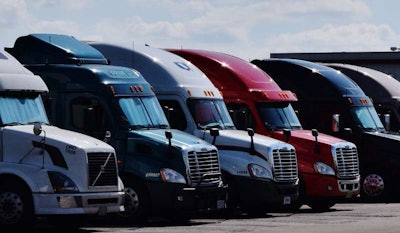“In my opinion, the trucking industry is very far behind the times on many levels, and this makes this industry very unattractive to the younger generation. … As sad as it is, I believe [Jenkins is] right on, and maybe it will get out to companies and help wake a few of them up and lead to industry changes.” –Craig McCue, Sasquatch HI-MT Water Inc.

From McCue’s vantage, in trucking overall “the pay is terrible for the hours worked. Company leaders could stand to make less and provide a little more for their employees. Companies should require more of their employees” in terms of professionalism.
Today, McCue operates a one-truck water tender “that I contract out to the U.S. Forest Service for wildland firefighting in region 6, covering Oregon and Washington. I rarely drive it, as I have a retired guy that drives it during the fire season. I pay all the expenses and I also pay very well, but I couldn’t get a twenty-something to do this work if my life depended on it.”
“We are a generation of leisure” in some cases to the point of laziness, Jenkins wrote in his piece, with answers at the ready to most any question at the click of a button. All the same, few seem to truly understand the reality of trucking as it fits in the consumption economy the generation was raised in, as he sees it.
Though, of course, there are many exceptions. Via email, Sid Rau of Texas-based Blue Streak Transportation told of his own 24-year-old son, who has “had his CDL since he was 21. He is currently working for Western Container Corporation here in Big Spring, Texas. He grew up with several of us being in the trucking business, and even though he holds two associate degrees would rather be trucking.”
 Does trucking have a “millennial” problem? If you’re using a mobile device, tap the image to call and weigh in with a voice message we may use in a future podcast. If you’re on a desktop, call 530-408-6423.
Does trucking have a “millennial” problem? If you’re using a mobile device, tap the image to call and weigh in with a voice message we may use in a future podcast. If you’re on a desktop, call 530-408-6423.Those among the twenty-somethings finding a home in trucking find there some sense of “purpose” and meaningful “connection and communication,” noted Kristin Ries of Dart Transit, who also offered some bullet points on the generation in question. “There are 74.3 million 18- to 34-year-old Americans,” she said, nearly 23.5 percent of the population and representing the largest demographic in the country today. “Millennials like feeling involved and want to make a difference, even if it’s in a small way.”
Communication via social media is a given for most, and having a mobile-friendly website as well as advertising will help companies reach twenty-somethings, she noted.
Twenty-somethings are “mobile” in other ways, too, noted Brandon M., commenting under the story here on OverdriveOnline.com: “I can honestly say from my perspective there needs to be a focus on professional growth emphasized. I am at a company driving after years in management jobs and in my late 20s. I started driving because the economic crash hit my industry hard, so new/upcoming management talent was cut first as we were the last hired. The company I’m at as well as all companies need to understand one major thing. Unlike previous generations, we are very mobile when it comes to where we live and where we work. I asked about possibly switching from driving at the small company I’m at to the operations side of things (I have 3 years as an operations manager) and was told ‘nothing on the horizon.’ Two days later a person from off the street was hired as an assistant operations manager. Funny thing the older manager generation doesn’t understand about twenty-somethings with work experience…. There are not many of us, and we have little to no loyalty when brushed aside.”
Philip Frank: “You hit the nail on the head, Brandon.”
‘Indie Trucker’: “There you go. You never know when the person you hire is going to be smarter than you, and the smartest person in the room is the one who can find it on the web the fastest.”
Other responses addressed a bevy of related issues, from the perception of a current of narcissism within the generation to more systemic problems such as pay:
Anthony Boyd: We live in a narcissist-induced coma. The younger generation, my generation, has absolutely no idea what sacrifice means but rather indulge themselves in instant gratification.
Kurt Keilhofer: A lot of how people look at the industry is just flat-out money-related. The older generation got into trucking when a driver could earn a middle-class income. That income has remained dollar stagnant while the costs of everything have tripled. I am willing to guess that trucking company executives do not earn less in adjusted dollars than what was paid 3 decades ago, as many drivers are.
‘Worn-out Pete’: In my opinion, the best recruiting tool wouldn’t cost the carriers one cent. It would be a list of the salaries paid to all drivers (as reported to the IRS), how long each driver had been employed and how many days they were away from home to obtain that salary. I left trucking for the oilfield and quickly found out that at the end of the year I had about the same amount of money and was home 14 days per month compared to less than half that while trucking. I discouraged both my sons from becoming truck drivers strictly by explaining how much hassle there is to contend with. Even though pay has now improved, it is still nowhere close to where it needs to be for a job that is figured on a 7-day work week instead of 40 hours.
Vincent Kelton: Just like in any relationship, the issues should be addressed. Point them out, then get the conversation going or there will be a break-up. Employee turnover. Drivers point out problems and companies don’t want to listen, so drivers leave. Then the company spends money on research that produces articles like this one. The article has no solution, but gets drivers chatting and posting online. The industry is always looking to fix the shortage, but never thinks it’s doing anything wrong. Reminds me of a former 100-pounds-overweight supervisor mad at the doctor that couldn’t find the magic pill to control his blood glucose and blood pressure.
Find the original piece featuring Jenkins’ prescription for the industry at this link.











